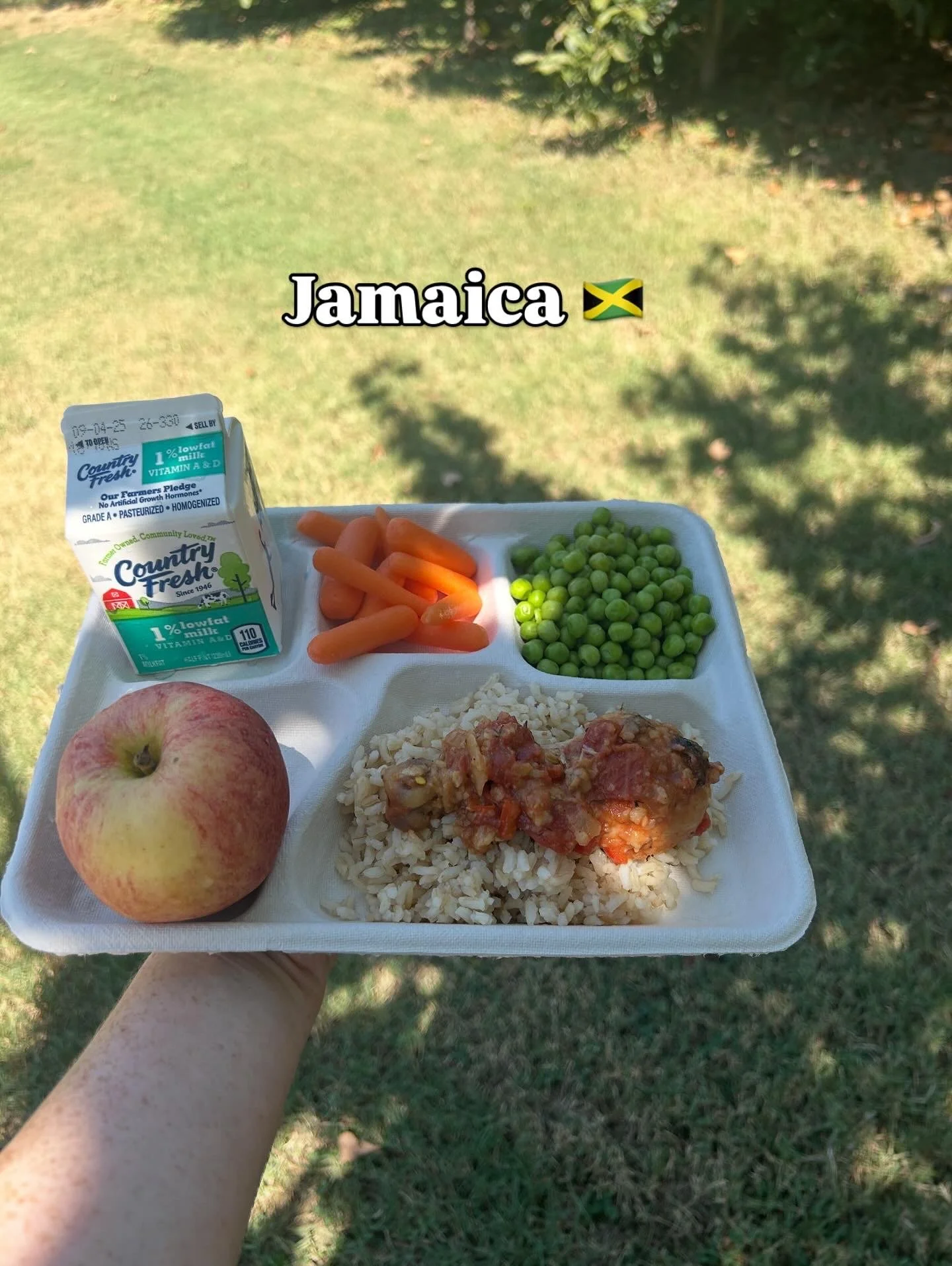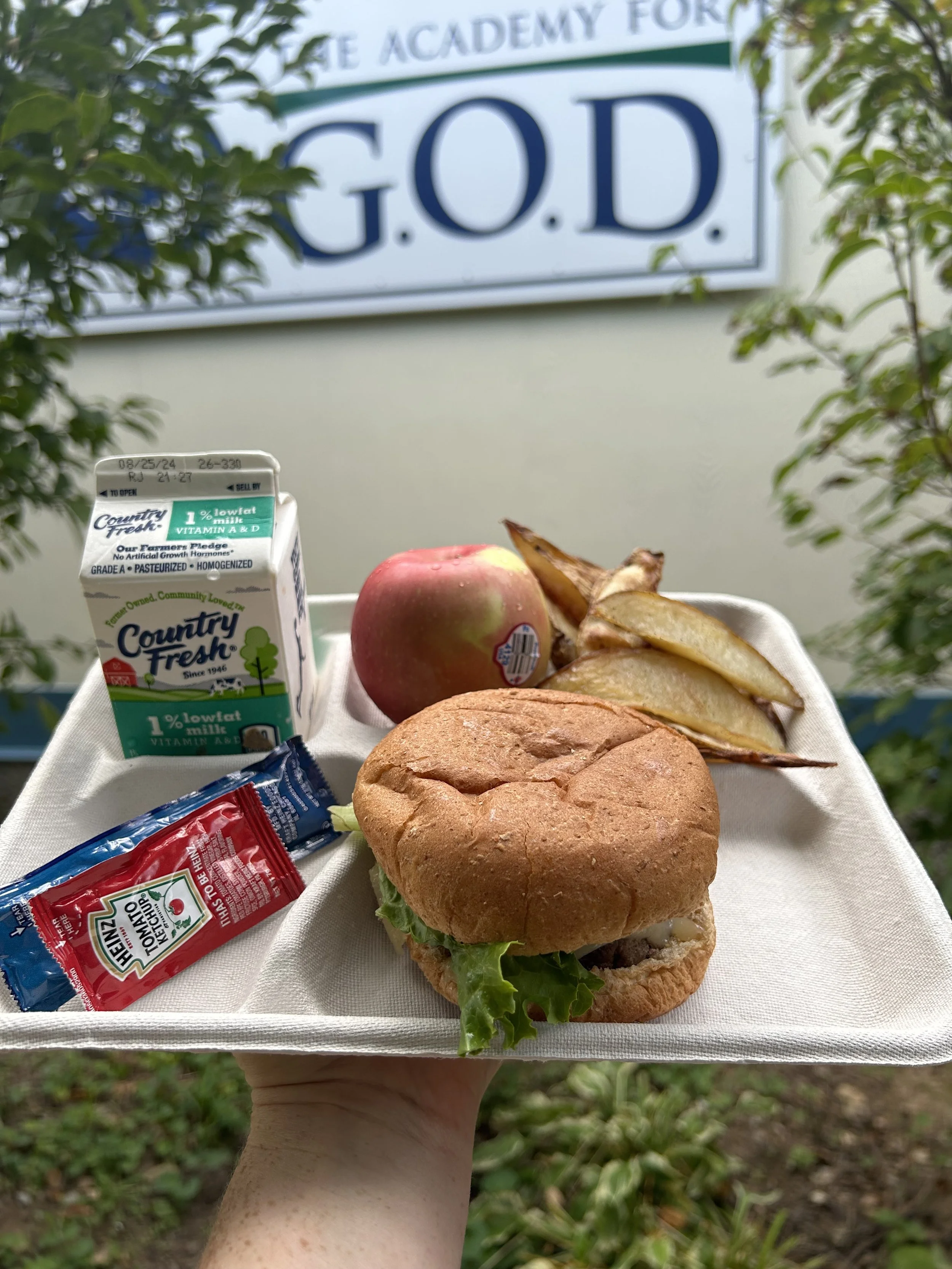Passport to School Lunch: A Global View from the Lunch Table
This year, our students are taking their taste buds on a world tour! We launched a new lunchtime challenge designed to help them try new foods and explore global flavors right from the cafeteria. Beginning in late September, students in our Kindergarten–Specifics levels received their very own lunch passports. Each time they sample every menu item from a featured country, they earn a stamp for their passport.
The goal isn’t to eat everything on the plate — it’s simply to try something new. For younger students, taking even one or two bites can be a big step. This challenge helps them build courage and curiosity when it comes to food. So far, students have traveled (via their trays) through the USA, China, Mexico, Jamaica, and Kenya — and they’re discovering some unexpected favorites along the way!
At the “passport table,” Mrs. Chigumira engages each student in a quick conversation about their experience — what they liked, what they didn’t, and what they learned from trying something new. These chats not only give valuable feedback for the lunch program but also celebrate each student’s willingness to explore and grow. Many have been pleasantly surprised to find a new dish they enjoy — and have even started adding it to their trays on regular lunch days.
The passport challenge has become a fun and meaningful way for students to gain a global understanding of food and an appreciation for cultural diversity. Even when a dish isn’t their favorite, they’re learning that stepping out of their comfort zone can be rewarding (and sometimes delicious!).
In a fun twist of timing, the School Nutrition Association announced its national school lunch week theme this year: “Taste the World: Your School Lunch Passport.” It’s the exact same theme we chose to kick off our new menu! It’s exciting to see that our students’ global lunch adventure aligns with national trends and reflects how today’s generation is more connected — and open to new experiences — than ever before.
How Nutrition Impacts Learning
School nutrition is not just childhood nutrition or adolescent nutrition, it is specific to nutrition while students are in school. This is an important distinction as we are looking most at how these meals will affect a student while they are in school. Our goal as a school nutrition program is to take a look at the ways we can help our students progress, learn and focus while they are on our school campus.
School nutrition is not just childhood nutrition or adolescent nutrition, it is specific to nutrition while students are in school. This is an important distinction as we are looking most at how these meals will affect a student while they are in school. Our goal as a school nutrition program is to take a look at the ways we can help our students progress, learn and focus while they are on our school campus.
What are some key nutrients students need to learn in school?
Dietary Fiber (Carbohydrates): A big part of school nutrition is ensuring students feel fuller longer. We want students to be in the classroom learning, listening, and absorbing knowledge not worrying about a growling stomach. A meal full of dietary fiber has the power to keep your student feeling fuller for a longer amount of time, since it will take more time for them to digest those foods. Foods rich in dietary fiber include whole grains, most fruits, vegetables, and even legumes.As part of the national school lunch program we are required to serve all students whole grains along with a fruit and vegetable every day. We are also required to have at least 1 serving of legumes per week. Each school lunch provides a more than adequate amount of dietary fiber to keep students feeling full during their school day.
Iron: Iron is another key nutritional component to school meals because of its role with memory and brain function. Students with optimal iron intake will also be less likely to be fatigued and prone to sickness. Iron is found in many different foods including, whole grains, dark leafy greens, red meats, poultry and more. School nutrition menu requirements also mandate that programs have a variety of vegetable subgroups which ensures students have access to the type of nutrients that support their body function. Our program must serve a certain amount of dark leafy greens, regular leafy greens, red/orange vegetables etc. This variety is key for optimal nutrient density in meals.
Protein: If the average elementary school student weighs about 80 lbs they would need about 40 grams of protein per day. In a single lunch they will be offered up to 25-27 grams of protein. This means a single lunch provides students with at least half or more of their daily protein intake. Protein is an essential nutrient for overall body function and when it comes to staying full longer allowing students to stay focused and ready to learn in their classes. A deficiency of amino acids (which are found in protein) for one could lead to an inability to focus during the day, which in turn could lead to behavioral problems and not retaining content learned in class. Amino acids can be found in meats, grains, dairy products and more. All of which are offered daily within our school nutrition program.
School nutrition has a direct impact on student learning, access to a variety of nutrient dense foods will give students the opportunity to achieve what they are capable of in the classroom. School nutrition programs have the unique opportunity to impact students with meals that will support attention span, focus, memory and even behavior.
School Meals: A Key to Reducing Chronic Disease
Proper nutrition during childhood and adolescence plays a vital role in shaping lifelong health outcomes. One of the most effective ways to support children’s health is by ensuring they participate in school nutrition programs, which guarantee access to a full serving of fruits and vegetables every school day. Research consistently highlights the positive impact of consuming adequate fruits and vegetables in reducing the risk of chronic diseases.
The Importance of Fruits and Vegetables for Growing Students
Health experts recommend that children aged 8 to 18 consume between 1.5 and 4 cups of vegetables and 1 to 2.5 cups of fruit daily, depending on their age, sex, and weight (1). However, meeting these nutritional goals can be challenging. School meal programs help bridge this gap by offering a diverse selection of fruits and vegetables, enabling students to choose options they enjoy while meeting their daily nutritional needs (2). In fact, students who participate in these programs can receive up to half—or even all—of their daily vegetable requirements during the school day.
This level of access benefits not only the students but also their families. Parents can rest assured knowing their children are getting a significant portion of their daily nutrient intake at school, reducing the pressure to prepare nutritionally complete meals at home. Additionally, the variety of produce offered in school meals exposes students to a broader range of nutrients, fostering better overall health.
How Fruits and Vegetables Combat Chronic Disease
Numerous studies have demonstrated the critical role of fruits and vegetables in preventing chronic illnesses. For instance, consuming adequate amounts is associated with lower risks of cardiovascular diseases and enhanced bone health. Furthermore, certain vegetables, particularly leafy greens, have been shown to offer protective effects against lung cancer. High-fiber foods, which are abundant in fruits and vegetables, also aid in the digestion of fats, proteins, and carbohydrates, contributing to obesity prevention and overall metabolic health.
Additional evidence links fruit and vegetable consumption to a reduced risk of various cancers, including intestinal, pancreatic, bowel, thyroid, and lung cancers. These nutrient-rich foods provide essential vitamins, minerals, and antioxidants that support the body’s natural defense systems (3).
Building Lifelong Healthy Habits
Participation in school nutrition programs does more than support physical health—it also serves as an educational tool. By regularly eating balanced meals that include full servings of fruits and vegetables, students learn what a healthy plate should look like. These habits can set the foundation for better dietary choices in adulthood, contributing to long-term disease prevention.
Incorporating school meals into a child’s daily routine is a simple yet powerful step toward improving health outcomes. By ensuring that students consume their recommended servings of fruits and vegetables, school nutrition programs not only reduce the risk of chronic disease but also foster healthier generations to come. Eating school meals is an investment in children’s current and future well-being—a step toward a healthier, brighter future.
(1) https://www.myplate.gov/eat-healthy/vegetables
Local Foods For School Grant Recipient
October is National Farm to School Month and our school nutrition program is pleased to announce the results of a recent farm to school grant that we have facilitated during both the 23/24 and through the first two months of the 24/25 school year.
The Local Food for Schools grant was part of the USDA’s program to bring local foods into schools and infuse funding into our local small farming economy. We are thankful that this grant did both! The school nutrition program purchased chicken, beef, turkey as well as some fresh vegetables over the course of the grant duration.
What was the impact of this grant on the menu? We were able to serve close to 3,000 lbs of chicken, almost 1,000 lbs of turkey and nearly 900 lbs of ground beef to our students. This amounts to about 100 meals in which our students had a local meat source on the menu. To put that into perspective the students have 180 days in a single school year. This accumulates to about 80% of their meals having a local protein that was served from August of 2023 through September of 2024.
What was the nutritional impact of this grant? The beef, turkey and chicken served through this time frame was mostly from Pure Pastures, a local small farm. They produce high quality meats that are: Non GMO, ethically raised, no vaccines, no chemicals, no medications, no antibiotics and no animal by-products. Their beef is 100% grass fed which creates a nutrient dense protein.
Grass fed beef tends to be higher in Omega-3 fatty acid, more antioxidants, more vitamin k2 giving more nutrient dense qualities to the beef and in turn the consumer. Pasture raised chicken “contains 50% more vitamin A compared to conventionally raised chicken.” Vitamin K is essential for immune function, vision and overall skin health.
Pasture raised chicken can also be found to have higher levels of iron, higher levels of omega 3 and higher levels of vitamin E. Overall the quality of the meat is greatly increased with pasture raised/grass fed animals. With this grant we were able to infuse our students' diets with high quality proteins and give them the nutrition they need to fuel a wonderful day of learning!
Summer EBT Program Improves Access to Nutritious Foods
The Department of Human Services in tandem with the School Nutrition State Department rolled out a program this summer to bring S-EBT (summer- Electronic Benefits Transfer) to students across the country. The Academy for GOD was able to participate in ensuring families who qualified received benefits that will give parents extra money to spend on groceries this summer.
The program gives students who receive free or reduced meals at school a one time payment over the summer to assist with groceries. Being part of the USDA’s national school lunch program has many benefits, one of which being we are able to participate in benefit programs that greatly help our families with the ever rising cost of food. When school lets out for the summer, families often feel the extra burden of groceries bills, especially if their student was getting a free or reduced meal at school This is a fantastic way to give some assistance to families during the summer months.
Since the pandemic hit our school nutrition program has participated in various iterations of this type of benefit issuance, where student have receive preloaded cards with funds for groceries. It is not only a financial boost for families but improving access to nutritious foods during the summer.
We are thrilled to be able to bring financial help to our families through our meal program and extend some helpful benefits through this coming summer!
Read more about S-EBT:



















